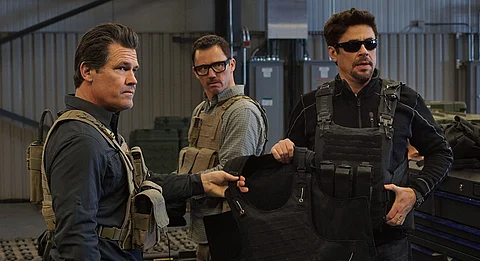
- Reviews
- Power List 2024
- Cannes 2024
- In-Depth Stories
- Web Stories
- News
- FC Lists
- Interviews
- Features
- FC SpecialsFC Specials

Director: Stefano Sollima
Cast: Benicio del Toro, Josh Brolin, Isabela Moner, Jeffrey Donovan
There's something missing from Sicario: Day of the Soldado, Stefano Sollima's follow-up to Denis Villeneuve's bleak, beautiful 2015 crime thriller. Perhaps the success of the similarly themed Netflix series Narcos, which premiered a month before Sicario, might have encouraged writer Taylor Sheridan (watch Hell or High Water to understand his obsession with dusty neo-Western badlands) to dig further into United States' law enforcement's uneasy equation with Mexican and South American drug cartels.
Except, other than the way it's shown – the craft is, again, top-notch, with the cinematography and score literally replicating Roger Deakins and the late Johann Johannsson's brooding palettes of invisible dread – there's nothing new about what is shown. The magic-hour frames and haunting aerial photography continue to tell more of a story than the bloodshed beneath. This time, it's just a tad more apparent.
Sicario 2 takes forward the morality-play thread of cold-blooded CIA officer Matt Graver (Josh Brolin) and his favourite hitman, ex-Medellin gangster Alejandro (Benicio del Toro), who are discretely hired by the US government to trigger off a Mexican drug-cartel war. Alejandro, it turns out, isn't done with avenging the murder of his family. Graver, perversely, preys on his lack of closure. They are, of course, both enforcers and victims of a system that has begun to resemble its own warped interpretations of terrorism.
In the first five minutes of the film, five people blow themselves up. In true spirit of the American way of orchestrating wars, this nerve-racking opening is purely incidental; the Defense Ministry somehow connects these Islamic suicide bombers to a vast refugee-smuggling border operation run by Mexican cartels. Their plan: destroy the cartels in the most roundabout way possible. In short, they employ Graver's "dirty" services to manipulate the drug lords into fighting one another so that they become vulnerable to American attacks. The logic might seem far-fetched, but the makers get this political whataboutery right. What they don't totally get right, however, is the structural coherence of a mission-gone-wrong plot.
It's not just the absence of the first film's jittery FBI-agent protagonist – and therefore the emotional core, and our eyes into this world – played by Emily Blunt. For starters, I'm not quite sure Villeneuve had designed a "setup"; Sollima's riff on the original universe feels very much like a chapter-wise block of a franchise. The characters occupy situations that, in stark contrast to their surroundings, seem to be following certain narrative rules. For whatever reason, within all the primal tension of what is essentially a chaotic mood piece, Sheridan has incorporated 'templates' into the writing.
For example, Graver's hold-no-hostages personality is "established" through a scene in Africa of him torturing a smuggler by mentally disintegrating him – Blunt had spent an entire film at conflict with his methods, but it's merely a passing device here. A teenaged boy being integrated into the illegal infiltration business is "introduced" in a parallel narrative – one that remains too inconsistent to eventually merge with the primary one. Once Graver ruthlessly decides to abduct a kingpin's 16-year-old daughter to pass it off as a rival-gang move, we are first shown a flimsy "establishment" scene where this girl, Isabel, bashes up a schoolmate for calling her a 'narco whore'.
Then there's the thread of Alejandro and this girl on the run; their 'attachment' is not entirely organic, even though it's supposed to humanize the story in a tired-superhero-Logan kind of way. The brutal climax feels strangely incomplete, because it insists on setting the stage for a third film. Most of these motifs bear the weight of having to move past the sheer cinema of the prequel to chart a dense direction of the sequel. It doesn't always work, despite del Toro's hypnotic presence and Brolin's fragile image of institutional villainy.
Much like in the ill-paced third season of Narcos, I see no compelling reason for this theme to explore a sense of redemption. Perhaps if the first film hadn't existed, conforming to types might have been fine. But if you're going to make this about Alejandro – who was so effectively used as a 'shadow,' a protagonist that was yet to recognize himself as the protagonist, by Villeneuve – there's always the risk of adapting a legacy instead of extending it. The hitman, after all, isn't always on target.